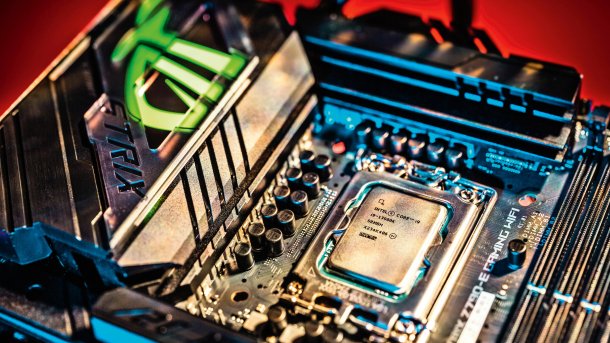Processor crashes: Intel discovers another bug
According to Intel, the stability problems with Core i-13000/14000 CPUs are caused by a bug in the microcode. However, this does not seem to be the whole truth.

(Image: c't)
The CPU manufacturer Intel has published a new statement on the crashes that occur in particular with the overclockable K processors of the 13th and 14th Core i generation "Raptor Lake". According to the statement, excessive core voltage is probably partly responsible for the unstable operation in certain scenarios. The problems are manifested, among other things, by crashing programs or blue screens when unpacking game data and compiling.
Videos by heise
According to Intel's analysis, the microcode of the processors contains a faulty algorithm that requires the wrong voltage for CPUs such as the Core i9-13900K. The microcode is the firmware for the processor. This can redirect almost any instruction in order to rectify errors in the processor. Intel has promised BIOS updates with updated microcode for mid-August, which should rectify the error of the excessive voltage. In a further statement to the IT magazine Digital Trends, Intel clarified that mobile processors are not affected.
Based on extensive analysis of Intel Core 13th/14th Gen desktop processors returned to us due to instability issues, we have determined that elevated operating voltage is causing instability issues in some 13th/14th Gen desktop processors. Our analysis of returned processors confirms that the elevated operating voltage is stemming from a microcode algorithm resulting in incorrect voltage requests to the processor.
Intel is delivering a microcode patch which addresses the root cause of exposure to elevated voltages. We are continuing validation to ensure that scenarios of instability reported to Intel regarding its Core 13th/14th Gen desktop processors are addressed. Intel is currently targeting mid-August for patch release to partners following full validation.
Intel is committed to making this right with our customers, and we continue asking any customers currently experiencing instability issues on their Intel Core 13th/14th Gen desktop processors reach out to Intel Customer Support for further assistance.
While researching the causes, Intel discovered another bug a few weeks ago, in which an error in the Thermal Velocity Boost turbo function caused the processors to run at too high a voltage. There are now BIOS updates for this as well as for the specification violations on the part of the mainboard manufacturers. For years, they had ignored power limits and protective functions in the delivery state with Intel's acquiescence.
Oxidation problems during production
(Image: Bild: Wikipedia, Nutzer: Cepheiden, CC BY-SA 3.0)
However, this does not mean that the problem is completely off the table, as an Intel employee confirmed in a post on Reddit that there were also manufacturing problems at least in 2023. The Intel 7 process of the Core i-12000, 13000 and 14000, which was previously referred to as 10 nanometer Enhanced SuperFin, can lead to unwanted oxidation, which means that the processor no longer runs stably.
Among other things, Intel uses tantalum nitride (TaN) as a barrier in its semiconductor chips to prevent copper from penetrating semiconductor layers. According to a video by hardware youtuber Gamers Nexus, when applying this layer, which is only a few atomic layers thick, it is possible for copper lines to oxidize due to oxygen-containing chemicals, water or the diffusion of oxygen at high temperatures.
Intel advises affected users whose 13th and 14th generation Core i processors are not running stably to contact customer support. Intel is also likely to provide further information in the coming weeks.
(chh)